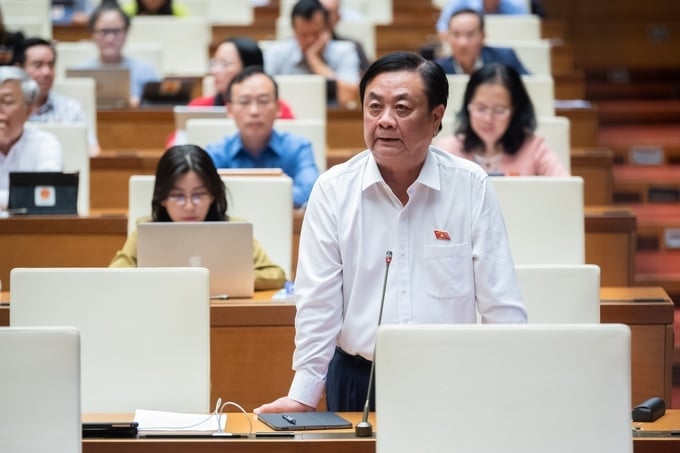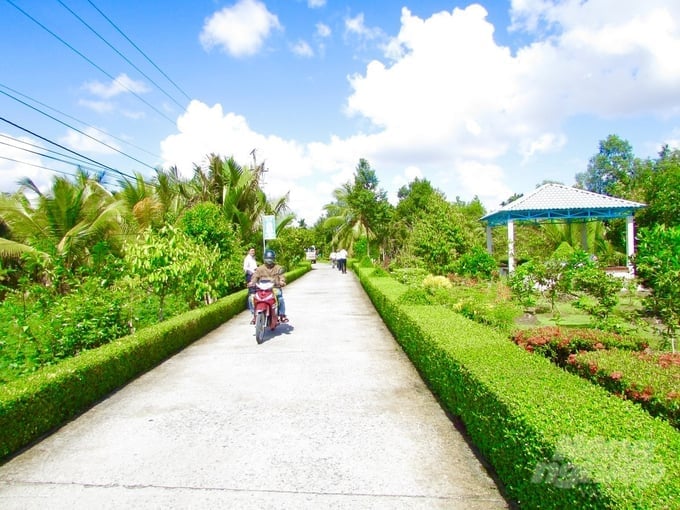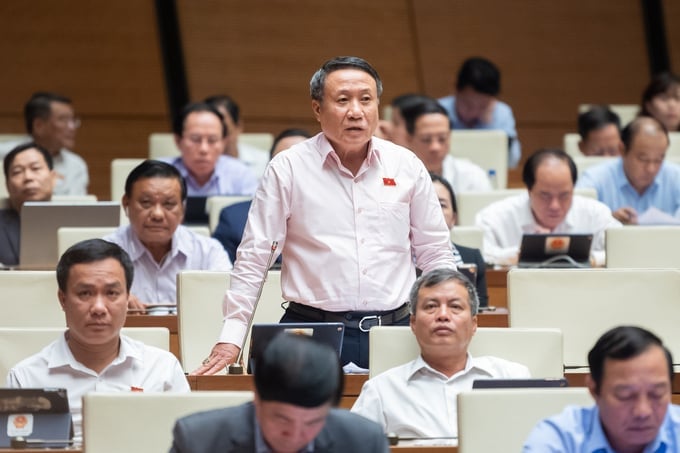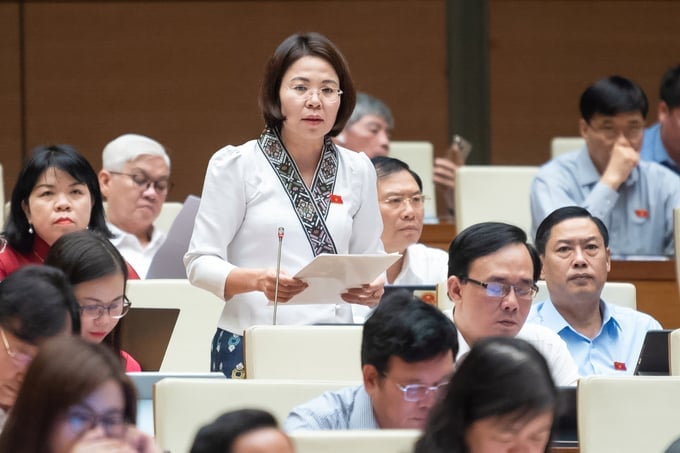May 20, 2025 | 20:50 GMT +7
May 20, 2025 | 20:50 GMT +7
Hotline: 0913.378.918
May 20, 2025 | 20:50 GMT +7
Hotline: 0913.378.918

The Minister of Agriculture and Rural Development stated that the National Target Program for New Rural Construction, which contributes to transforming the rural landscape, has been acknowledged by international partners.
During the 6th session of the 15th National Assembly on October 30, delegates discussed the implementation of the National Assembly's Resolutions on National Target Programs.
Minister of Agriculture and Rural Development Le Minh Hoan, expressed agreement with the supervisory delegation's approach and reasonable assessments. Additionally, he made several suggestions to the Central Steering Committee for the three National Target Programs to further refine their mechanisms, policies, and guidance for implementation.
"The opinions raised by National Assembly delegates have offered insightful information, in addition to acknowledging and evaluating the achieved milestones after the 5-year implementation of the National Target Program for new rural construction. These endeavors have significantly contributed to transforming the rural landscape and have been recognized by international partners," stressed Minister Le Minh Hoan.
Regarding limitations highlighted during the session, Minister Le Minh Hoan added that the existing unnecessarily complex system of guidance documents originate from a multifaceted approach, and the collaboration across various governmental levels lacks close coordination, especially in terms of designing complex programs with limited resources.
Consequently, Minister Le Minh Hoan proposed the Central Steering Committee to collaborate and resolve existing issues.
The Minister also proposed that a feasible solution would involve a review of the delegation and decentralization mechanism, with a focus on funding for district-level operations. Accordingly, the Minister emphasized that it is imperative to ensure the achievement of all indicators and goals set out for sustainable rural area construction.
However, disparities persist among different provinces and cities despite the implementation of specialized mechanisms for individual regions within the new rural construciton program. Additionally, multiple delegates have voiced their concerns regarding the different levels of the program's effectiveness across different provinces within the same region. As a result, the majority of challenges encountered in the program's implementation can be found in below-average provinces or cities. Consequently, Minister Le Minh Hoan aims to present this issue to the Central Steering Committee for future consideration.
According to the Minister, although the current results may fail to meet the targets, they signify significant efforts from the local governments, especially when support from the Central government has been halved. Nevertheless, these intially strong efforts are beginning to show signs of steady decline.

The National Target Program on new rural construction has contributed significantly to the revitalization of rural areas, thereby creating many livable and flourishing regions.
Furthermore, there are administrative barriers between different sectors. The organizational structure of the three programs and the reception capacity of local officials, with the constant turnover of commune-level officers, pose numerous limitations. These barriers necessitate the need for a stronger focus on training for local officials.
According to the Minister Le Minh Hoan, a select few indicators must undergo reassessment in preparation for the future. Notably, when communes achieve the new rural status, support resources for these areas will cease.
Accordingly, practice has revealed several deficiencies in the design of the three national target programs. These programs are faced with a dual pressure; namely, the expectation for every commune to achieve the new rural status and fulfill the National Assembly's target. On the other hand, the resources to support these new rural areas are limited.
Consequently, the issues in policy design must be re-examined in the near future to reinforce local capacities in compensation for the limited central resouces. It is also essential to fully utilize the community's capacities.
Delegate Ha Sy Dong - Provincial National Assembly delegate of Quang Tri province, states that the three national target programs align with the Party's Resolutions as well as meet the people's expectations.
Accordingly, the most successful program is the National Target Program for new rural construction, which has progressively revitalized the rural landscape, thereby creating numerous livable rural areas. However, the current implementation of the three programs encounters obstacles in terms of documentation conflicts and the lack of coherent coordination. Consequently, these factors have resulted in delayed disbursement and challenging implementation.

Delegate Ha Sy Dong - Provincial National Assembly delegate of Quang Tri province.
Delegate Ha Sy Dong expressed his agreement with the solution of comprehensive delegation of authority and power to local governments, and the removal of unnecessary criteria to facilitate the implementation process. He highlighted that this effort will greatly contribute to realizing the programs.
Sharing the same viewpoint, Delegate Ho Thi Kim Ngan from the National Assembly Delegation of Bac Kan province, expressed her concurrence with various aspects of the supervision report and the National Assembly's draft resolution regarding national target programs from 2021 to 2025, with a focus on sustainable poverty reduction, and socio-economic development in ethnic minorities and mountainous regions from 2021 to 2030.
She emphasized that the criteria for the new rural construction program from 2021 to 2025 have raised significantly, posing higher demands compared to the former set of criteria. Maintenance of the previously-acknowledged new rural status is gradually becoming a challenge under new criteria. Moreover, several criteria are difficult to evaluate presently, such as the proportion of people with electronic health records, the rate of individuals with electronic health books, and participation in remote medical applications due to ongoing economic hardships as well as limited Internet and smartphone access in various areas.
Moreover, some criteria are not designed to match reality, such as the target multidimensional poverty rate of under 13%, which is a significant challenge for many localities. The delegate emphasized the need for prompt advisory services, amendments, and supplementation of the new set of criteria to correspond with reality, with a special focus on ethnic minorities and mountainous regions.
The delegate also highlighted the necessity for a comprehensive, and long-term set of criteria. During the implementation process, amendments and supplements are recommended to correspond with reality if any criteria fail to match the actual context.

Delegate Hoang Thi Doi from the National Assembly Delegation of Son La province - proposed amendments and supplements to the new rural criteria to correspond with reality. Photo: Quochoi.vn.
According to Delegate Hoang Thi Doi from the National Assembly Delegation of Son La province, the implementation of Decision No. 318 and Decision No. 319 by the Prime Minister regarding the establishment of criteria for new rural areas, advanced new rural areas, and exemplary new rural areas, involves region-specific criteria in oder to correspond to regional conditions.
However, certain criteria, such as multidimensional poverty income, are relatively high, and the economic and social development speed of the communes struggles to meet the set of criteria.
Several criteria are challenging to implement due to real-life applications, such as the need for communes to establish concentrated raw material areas for origin traceability. In reality, many communes in Zone III across different provinces lack concentrated raw material areas, with small-scale agricultural, forestry, and aquaculture activities follow seasonal habits.
Moreover, criteria outlining the area of sports field and the percentage of cremation facilities are not suitable for ethnic minority regions. As a result, the delegate proposes the amendment, revision, and supplement of criteria to correspond to reality for effective implementation and goal attainment.
Translated by Nguyen Hai Long

(VAN) In 2024, over 295 million people across 53 countries and territories faced acute hunger—an increase of almost 14 million people compared to 2023, while the number of people facing catastrophic levels of hunger reached a record high.

(VAN) World Environment Day 2025 (June 5) carries the theme 'Beat Plastic Pollution' continuing to emphasize the global urgency of addressing the plastic waste crisis.

(VAN) This was the assessment shared by experts at the workshop titled 'Assessing the Role and Potential of Low-Emission Rice Production Systems in Vietnam,' held on the morning of May 19.

(VAN) Cai Rong Port is the fisheries control center of Quang Ninh, helping to monitor fishing vessels, combat IUU fishing, and remove the EC's 'yellow card'.

(VAN) The German Agricultural Society (DLG) explores the possibility of establishing a mechanization service center in Vietnam’s Mekong Delta to support farmers in accessing and utilizing advanced machinery.

(VAN) On May 16, the Department of Water Resources Management, in collaboration with the Food and Agriculture Organization of the United Nations (FAO), held a signing ceremony for the GEF-8 project document.

(VAN) Food safety, mechanization, vocational training, and market opening are key areas of cooperation expected between the Vietnamese Government and the Federal Republic of Germany.